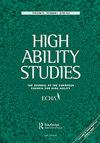Smart is who makes lots of errors? The relevance of adaptive reactions to errors and a positive error climate for academic achievement
IF 1.3
4区 教育学
Q2 EDUCATION, SPECIAL
引用次数: 10
Abstract
ABSTRACT Learning form errors seems to be crucial for talent development, but there is evidence that students learn little from their errors during school instruction. This work addressed the interplay of different adaptive reactions to errors (affective-motivational adaptive and action-related adaptive reactions), a positive error climate in the learning context and cognitive abilities with regard to their effect on academic achievement. A longitudinal data set with 2092 students attending 74 classes was analyzed with a two-level path modeling approach (students in classrooms). The results confirmed the assumption that affective-motivational adaptive reactions to errors encourage action-related adaptive reactions to errors which, in turn, foster academic achievement. Furthermore, analyzes indicated that the relationship between a positive error climate in the classroom and academic achievements is mediated by students’ individual reactions to errors. In contrast to expectations, students with higher cognitive abilities did not show more adaptive reactions to errors.聪明就是犯很多错误的人?对错误的适应性反应和积极的错误氛围与学术成就的相关性
摘要学习形式错误似乎对人才培养至关重要,但有证据表明,学生在学校教学中从错误中学到的东西很少。这项工作探讨了对错误的不同适应性反应(情感动机适应性反应和行动相关适应性反应)、学习环境中的积极错误氛围以及认知能力对学业成绩的影响的相互作用。采用两级路径建模方法(课堂上的学生)对2092名参加74个班的学生的纵向数据集进行了分析。研究结果证实了这样一种假设,即对错误的情感动机适应性反应会鼓励对错误的行动相关适应性反应,从而促进学业成绩。此外,分析表明,课堂上积极的错误气氛与学习成绩之间的关系是由学生对错误的个人反应介导的。与预期相反,认知能力较高的学生对错误没有表现出更多的适应性反应。
本文章由计算机程序翻译,如有差异,请以英文原文为准。
求助全文
约1分钟内获得全文
求助全文
来源期刊

High Ability Studies
Multiple-
CiteScore
4.80
自引率
11.10%
发文量
7
期刊介绍:
High Ability Studies provides a forum for scholars in a variety of disciplines associated with the development of human abilities to their highest level. It is a medium for the promotion of high ability, whether through the communication of scientific research, theory, or the exchange of practical experience and ideas. The contents of this journal are unique in reflecting concerns and recent developments in this area from childhood and across the whole life span in a variety of contexts. Far from being restricted to the traditional focus on high-level cognitive development, it also presents investigations into all other areas of human endeavour, including sport, technology, the arts, business, management and social relations.
 求助内容:
求助内容: 应助结果提醒方式:
应助结果提醒方式:


